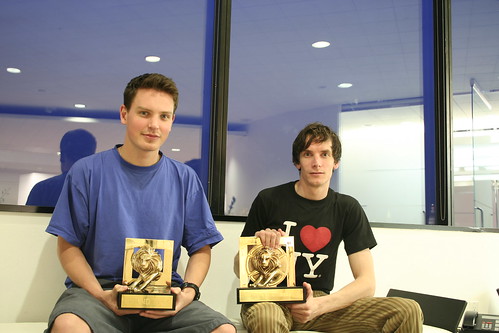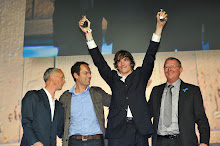Saatchi & Saatchi NY
If you walk in an agency, you can tell something about the level by just looking at the awards that they have. If you can spot one or two awards, they are probably the only awards they've ever won. If they have numerous awards piled up on shelves, you're in a good agency. At Saatchi New York there are just lions at the entrance: the Print Grand Prix and the Cannes lion for the agency of the year.
This is indicative for Saatchi NY. They're don't want to show off what they've won, but display only the two most prestigious awards in the world. The rest of their awards are scattered all over the agency. I once saw about 25 Clio's in an office. I asked the woman who was working there if the Clio's were all from this year. "Yes", she responded, "but these are only the bronze ones".
Yesterday was my last day and I can look back on a the most inspiring internship ever. No offence to other agencies I've worked, but Saatchi New York is by far the best agency I've ever been. It's hard to believe that this agency was used to be considered not very creative. What makes an agency like Saatchi so good? What is the secret behind Saatchi New York? I cannot give a clear answer to that, but there are some factors that might have contributed to the high creative level here. I think they can be helpful for every agency that wants to become famous.
First of all the benchmark of creative work is higher than any agency in the world. Jan and Leo are two outstanding creative directors who kill every idea that's not excellent. When they say something is good, it probably is. It was also difficult for me, because at Saatchi it's hard to impress. If you show 20 campaigns, it's not considered outstanding, it's normal here.
And if you think every creative team is outstanding, that's not true. All creative teams are very very good, but I think only five creatives here win all the awards. Nevertheless, the creative directors take everybody on the creative floor seriously. No matter what age, level or amount of awards you've already won. And extra attention goes out to the interns. Julien and I got more coaching than in any other agency and copywriter Icaro Doria looked at our work at least twice a week to see if there's something in it that can win awards.
Talking about the creative work: the keyword here is 'insights'. If you make an ad for a coffee brand, every idea that just says "coffee keeps you awake" goes into the garbage can. The creative directors want to see an original insight. So rather than starting with an idea, you first have to think about a new and interesting message about the product. If it's not new, then the idea stands no chance. Just as a joke, we once showed an idea in which somebody cuts a tomato with a television because it's so thin to creative director Leo Premutico. He couldn't laugh about it.
Even after the idea is sold, the struggle goes on. The execution must be perfect. Nobody is in a hurry to produce a campaign. A good campaign needs time for execution and at Saatchi they understand that. When we worked for a pitch, Leo made us change every single piece of work about ten times. It took us two days just to make all the changes. And in the end even a spelling corrector came to see if all the comma's were in the right place. Producing an ad takes even more time. If it takes a year to make it perfect, it takes a year. It's as simple as that.
Something I didn't expect when I first came to this agency: people aren't working their asses off. Although the Saatchi building is open 24/7, there's rarely somebody in the agency after seven. "But of course people work at home after work", I asked my one of my former schoolmates Michael, who works there. "No, they rarely do that", he answered. Creatives have a life here and it's not only about advertising. I saw the same in Stockholm and at Duval Guillaume and they make good work anyway. I think working all the time isn't good for anybody. You have to go out and get inspiration. Finishing your work in time also forces everybody to work more efficient.
It's clear that there's an excellent creative floor here. I cannot say anything about the accounts or the planners, because strange enough I never had to do anything with them. They seem to keep the creatives away from account or planners. The creative directors are the only ones who judge the work. After they've chosen the work, they're going to talk to the account group. But the creative team that's responsible is asked to leave. Personally I think it's really good. Creatives aren't telling accounts how to do their job and neither do accounts. I think 50% of the time in an agency is wasted on politics; useless fights between account and creatives. As if there's some sort of battlezone where two parties fight each other. No, creatives only have to be creative and account managers have to sell the ideas to the client. Everybody is doing what they're supposed to do.
And now to come back to the awards. Tony Granger told Saatchi at the beginning of a video presentation that there wasn't a great party when Saatchi became agency of the year in Cannes. He told us he saw many agencies going from being at the top of the world to no awards in Cannes the next year. You always have to push your creativity further. Feeling like you're already the best can make an agency overconfident and when you stop being insecure, you stop making good work.
You can see that mentality on the creative floor at Saatchi. Nobody's behaving like they're some sort of advertising guru, even if they have all the awards to behave like one. They're not gods, they're normal people like you and me. They just happen to do their job really good.
Winning so many awards in a year that you don't even have a place to put it and you end up showing just two of them. That's Saatchi in a nutshell. I had a great time here and I'm going back next week to thank people for helping me pushing my creative capabilities to the maximum.



3 Comments:
"there's rarely somebody in the agency after seven"
Says the guy who was wondered earlier on this blog that few people were at Duval Guillaume Brussels after 8pm. :)
Exactly, haha. It proves that an agency doesn't have to make a lot of hours to make good work. Creatives can have spare time again ;-)
for clarification: "there's rarely somebody in the agency after seven" - actually there's rarely somebody on the CREATIVE floor after seven... and the ACCOUNT people work regularly to 8, 9, 10 and often midnight. I work on 17 - I saw you at the gym alot. Glad you enjoyed the internship!!
Post a Comment
<< Home